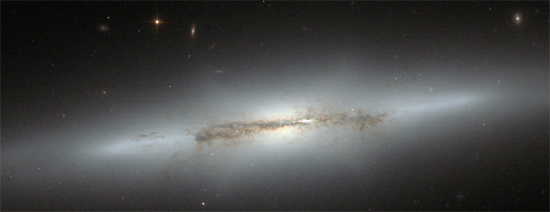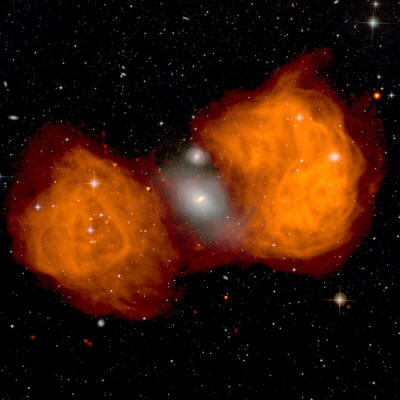|

by Stephen Smith
June 27, 2011
from
Thunderbolts Website
Spanish version

Edge-on galaxy
NGC
4710
Credit: NASA and ESA.
A pair of field aligned currents can be seen discharging from the
core of this active galaxy.
Any substance containing charged particles is a plasma:
...are plasma.
Filaments of electric current can flow in closed circuits through
plasma. It is the existence of electric circuits in space that
distinguishes Electric Universe theory from most conventional
viewpoints. Phenomena that appear "mysterious" to space scientists
are readily explained using observational evidence coupled with the
results from laboratory experiments.
That fact helps to distinguish
Electric Universe concepts from others. Gravity cannot be modeled in
the laboratory in the ways that plasma can.
X-ray emissions from planets, braided plasma filaments,
hourglass-shaped nebulae, and jets of charged particles erupting
from galactic axes provide observational evidence for the existence
of plasma circuits in space. Celestial bodies are not isolated from
one another but are connected across vast distances.
Electric discharges in plasma create tube-like magnetic sheaths
along their axes. If enough current flows, the discharge causes the
sheath to glow while sometimes creating other sheaths within it.
These "double layers" form when positive charges build up in one
region and negative charges build up nearby. An intense electric
field develops, which accelerates charged particles. Electric
charges spiral in the magnetic fields, emitting X-rays, extreme
ultraviolet, and sometimes gamma rays.
Electromagnetic forces squeeze those conductive channels, called "Birkeland
currents," into filaments that tend to attract each other in pairs.
Electric fields that form along the plasma strands generate an
attractive force that can be 39 orders of magnitude greater than
gravity. However, when they get close to each other, instead of
merging, the plasma "cables" twist into a helix that rotates faster
as it compresses tighter. It is those "cosmic transmission lines"
that make up galactic circuits.
The cosmos appears to be interlaced with those interacting circuits.
Each of those circuits appears to be composed of untold numbers of
twisting Birkeland currents. At the largest observable scale, there
are power-consuming loads in the circuits that convert electrical
energy into rotational energy. These are known as galaxies.
Since galaxies exist within a filamentary circuit of electricity
that flows through the cosmos, they should be evaluated according to
electrodynamic principles and not on mechanical kinetic behavior
with mysterious magnetic fields added to save the theory.
For example, twin lobes of gamma rays in an hourglass shape extend
axially beyond the Milky Way's central bulge (below video).
Time lapse video of
night sky as it passes over the 2009 Texas Star Party in Fort Davis,
Texas.
The galactic core of
Milky Way is brightly displayed. Images taken with 15mm fisheye
lens.
Each structure
measures approximately 65,000 light-years in diameter.
Plasma physicists are familiar with hourglass shapes. The funicular
formations are an unmistakable signature of Birkeland currents
squeezing plasma and charged dust into z-pinch compression zones.
The intense magnetic fields associated with Birkeland current
filaments cause electrons to accelerate with velocities close to
light speed. Those excited electrons emit synchrotron radiation, the
principle source for gamma rays in space.
Electric Universe advocates have long known that radio lobes far
above the poles of active galaxies (below image) are the signature of Birkeland
currents.

In the case of NGC 4710, partial field aligned ring
currents can be seen extending out from the galaxy's core.
According to astronomers,
NGC 4710's central "X" is mysterious, and
could be due to the vertical motion of stars around its nucleus.
They do not know why the stars are consolidated into symmetrical
rings. However, the structure is another example of energized
plasma.
Looking for answers in gravitational theory will not help to
resolve its enigmatic form.
|


